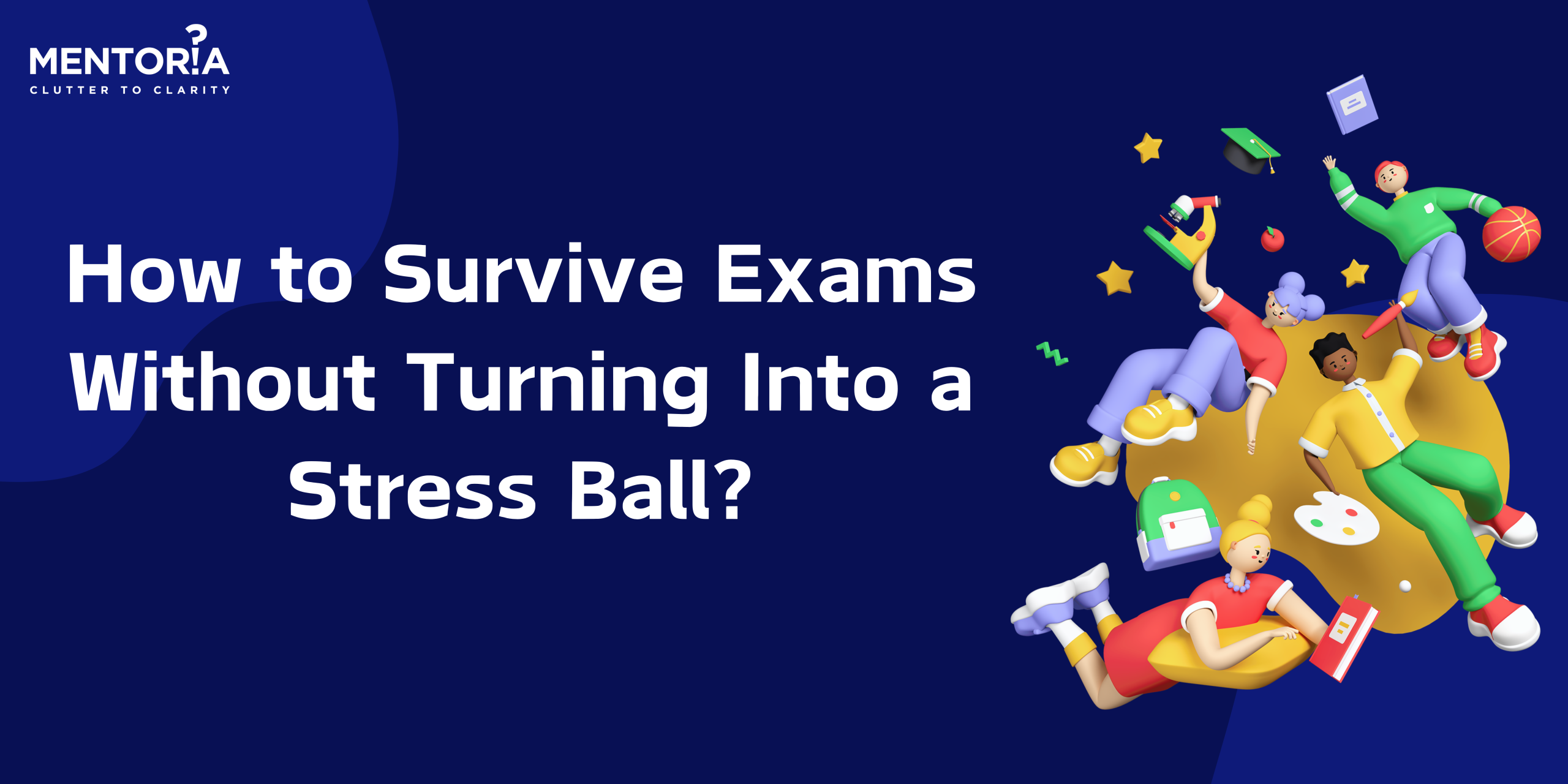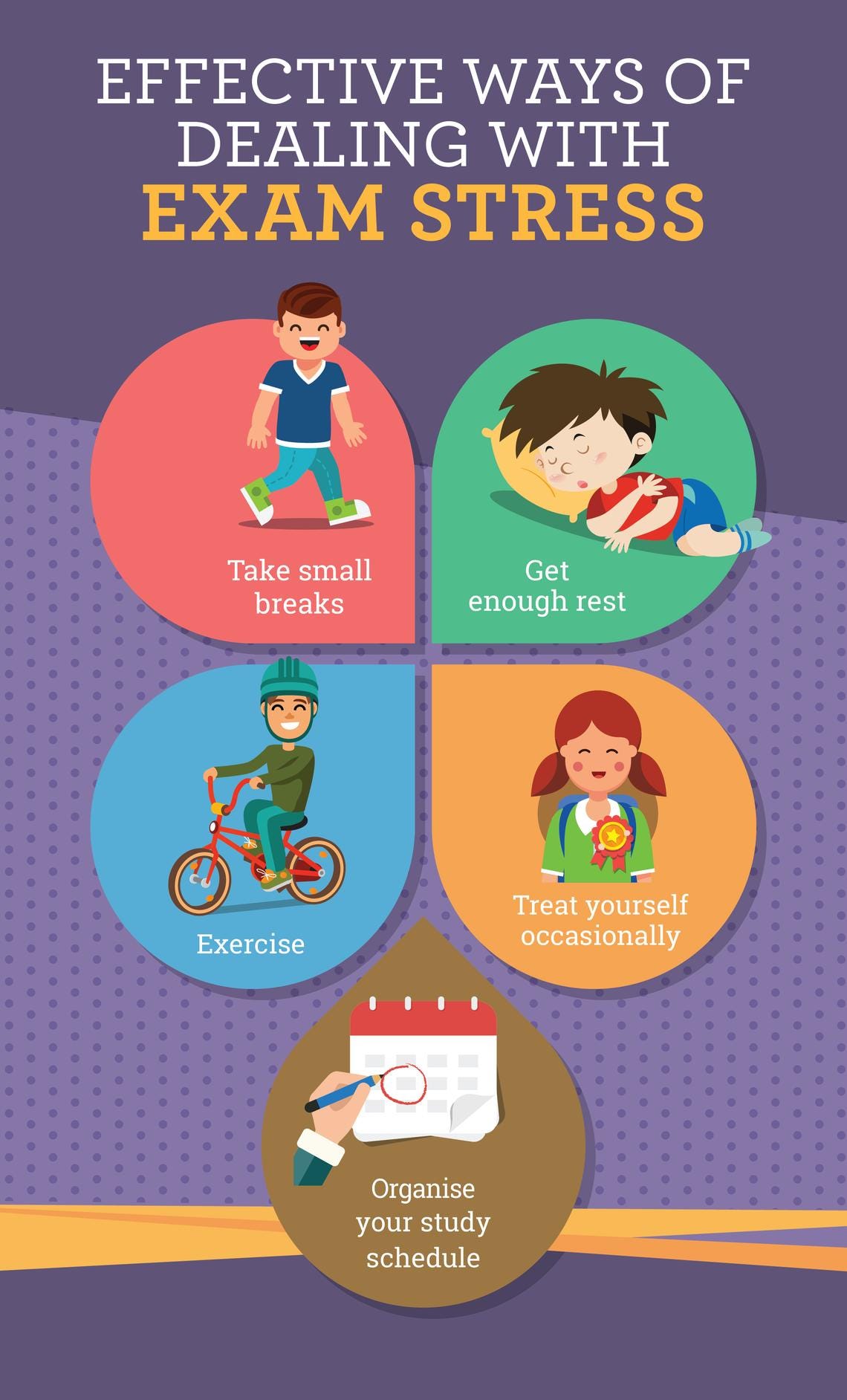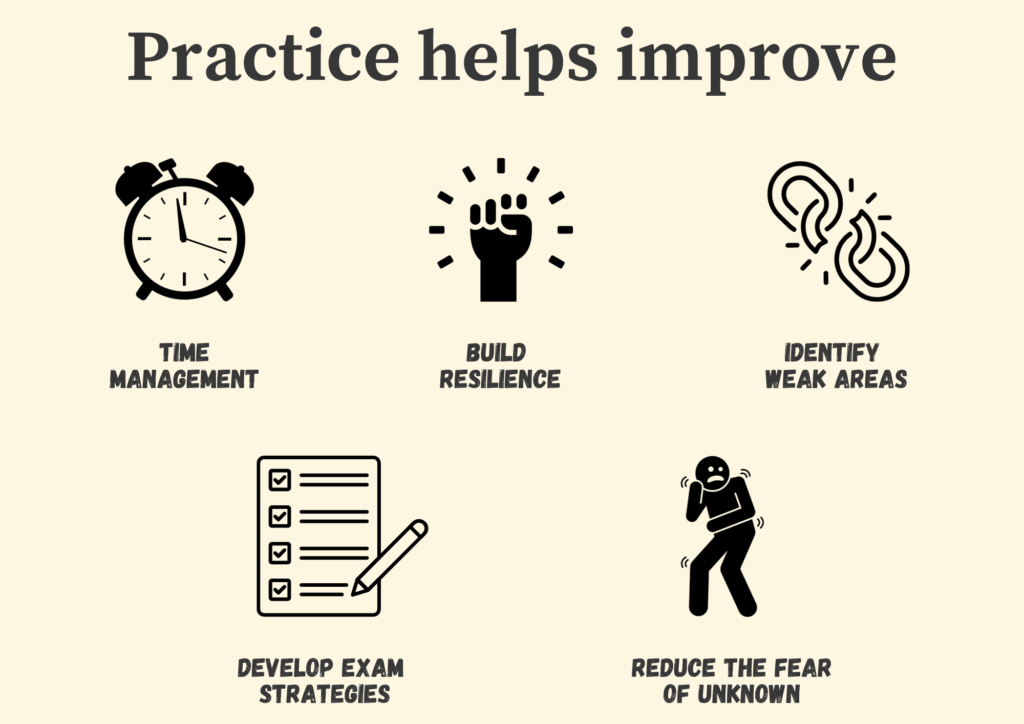How to Survive Exams Without Turning Into a Stress Ball?

Ah, exams. The word itself is enough to send shivers down a student’s spine. One moment you’re vibing, the next, you’re drowning in notes, textbooks, and questionable life choices. You sit down with your books, highlight random stuff, and after an hour, realise you’ve been staring at the same page. Sound familiar?
But exam revision doesn’t have to be stressful. With the right techniques, you can revise smart, stay sane, avoid last-minute panic, and actually remember what you learn. Here’s how you can do it without losing your mind.
1. Don’t just read—learn actively
Studies show that students who take active notes recall 50% more than those who only read. Here’s a quick exercise: read a page, close the book, and write down what you remember. If you find yourself struggling, it’s a clear sign that passive reading doesn’t work. In this case, you need to shift to active learning strategies to boost retention and deepen your understanding.
Here are a few ways you can do it:
- Teach someone else – Try explaining the topic to a friend, sibling, or even your mirror. If you can explain it clearly, you’ve understood it.
- Use mind maps and flashcards – Writing down key points in diagrams or using flashcards helps your brain remember better. Apps like MindMeister, Quizlet or Anki can help.
- Solve past papers – Exam questions often repeat, so practising past papers will give you an idea of the type of questions to expect. Download papers from your school/university website or Toppr.com for board exam practice.
- Write instead of just reading – Jot down short notes or summaries after reading a chapter. Writing helps your brain process information better.
2. Take short breaks to stay focused
Taking breaks works because they allow your brain to switch from an intense focused mode to a more relaxed mode. This shift helps replenish mental energy, reduce stress, and improve cognitive function. As a result, when you return to your task, you’ll be more productive and focused. Just like your body needs breaks after physical activity, your brain also needs time to rest and recharge to perform at its best.
To take effective breaks, you can try these:
-
- Use the Pomodoro technique – Study for 25 minutes, then take a 5-minute break. Repeat this cycle four times, then take a longer break. Make use of the Pomodoro Timer app to help you keep track.
- Change Your Environment: Step away from your study spot and take a short walk outside or move to another room. This change of scenery helps refresh your brain, reduces mental fatigue, and can improve focus when you return to studying.
- Set a “No-Screen” Rule: Use your break to do non-screen activities, like drinking water, organizing your desk, or jotting down quick thoughts. This ensures you’re not sucked into social media or other distractions.
- Do a Quick Physical Activity: Try a 5-minute exercise like jumping jacks or stretching. This will boost circulation and refresh your mind. Stick to physical activities only and avoid checking your phone or turning on the TV.
- Practice the 20-20-20 Rule: Every 20 minutes, look at something 20 feet away for 20 seconds. It helps reduce eye strain and gives your brain a quick reset.
3. Make studying fun and interesting
Let’s be honest—studying can feel boring. But you can make it more enjoyable by switching up your methods.
Here’s how to keep things interesting:
- Use videos and podcasts – If reading feels dull, try watching YouTube videos on the topic. Check out channels like CrashCourse or Khan Academy. You can also explore subject-related podcasts as they work great for revision.
- Join a study group – Studying with friends can make learning more interactive and enjoyable. Just make sure it doesn’t turn into a gossip session!
- Use gamification techniques – Turn your revision into a game. Apps like Brainscape make studying more fun by using flashcards to enhance retention and learning efficiency.
- Reward yourself – Set a goal, like “After finishing this chapter, I’ll treat myself to a snack or 10 minutes of YouTube.”
4. Take care of your health
Your brain needs energy to function well. If you’re sleep-deprived and eating junk, you won’t be able to focus. To stay fresh and active while studying:
- Get enough sleep – Your brain processes and stores the information you’ve learned while you sleep. Pulling all-nighters deprives your brain of this process, leading to memory gaps the next day. Aim for 7-8 hours of sleep to allow your brain to consolidate learning. If you’re short on time, consider power naps (20-30 minutes) to boost alertness without disrupting nighttime sleep.
- Eat brain-boosting foods – Junk food gives you a temporary dopamine rush but slows down your brain’s processing. Switch to snacks like nuts (rich in omega-3s for brain function), fruits (antioxidants to protect brain cells), and dark chocolate (flavonoids to boost memory). These foods help maintain energy levels and enhance focus, keeping you awake and sharp during study sessions.
- Drink plenty of water – Dehydration leads to brain fog and sluggish thinking because it reduces blood flow and oxygen to the brain. Keep a water bottle nearby and aim for at least 8 cups (2 litres) a day. If you don’t like plain water, try adding lemon slices or cucumber for flavour without sugar.
- Exercise or stretch – Physical activity increases blood flow to the brain, improving oxygen supply and focus. Even a 10-minute brisk walk releases endorphins that reduce stress and enhance concentration. Try simple stretches like touching your toes or neck rolls to ease tension and refresh your mind between study sessions.
5. Last-Minute Survival Strategies
Panicking before an exam clouds your mind and prevents you from thinking clearly, which is the last thing you need. Even if you didn’t prepare well, don’t waste time stressing. Instead, focus on what you can control like quickly grasping key concepts and improving recall. These actionable strategies will help you make the most of every remaining minute:
-
- Target Important Topics– Focus on 2-3 high-weightage topics instead of skimming everything. Quickly review class notes or study guides for recurring themes or topics that were frequently emphasised by your teacher. For example, if you’re studying biology, focus on key topics like the cell cycle or photosynthesis rather than diving into less significant subtopics like rare plant species. This targeted approach helps you retain high-priority information in minimal time.
- Create Mind Maps or Flow Charts– Visual learners can benefit from sketching quick mind maps or flow charts to connect related concepts. For example, draw a flowchart linking historical events to their causes and outcomes. This gives you a quick, bird’s-eye view of the topic, making it easier to recall under pressure.
- Speed Memorisation with Mnemonics– Mnemonics helps because it transforms complex information into simple, catchy phrases. For example, to remember the first elements of the periodic table (Hydrogen, Helium, Lithium, Beryllium, Boron, Carbon), use “Hi He Likes Beer But Cold”. This kind of phrase creates strong mental associations and allows you to quickly retrieve key facts without the need for deep comprehension.
- Use YouTube for Quick Explainers: Watch 5-10 minute crash course videos on major topics. Videos engage both your auditory and visual senses, enhancing memory retention by activating multiple areas of the brain. Additionally, chunking—breaking down information into smaller, digestible pieces can help you absorb and recall key concepts faster, which is essential during last-minute prep.
Final thoughts
Exams can feel overwhelming, but with the right approach, you can revise effectively without stress. Start early, use active learning techniques, take regular breaks, and prioritise your health—these small changes can make a big difference. Remember, your grades don’t define your worth, and if exam pressure is getting too much, you don’t have to go through it alone.
We’re offering free Exam Stress Management (ESM) sessions at the CDC in Mumbai, and if you’re not in the city, you can book online sessions from the ExamReady portal. These sessions will help you stay calm, improve your focus, and tackle exams with confidence. Book your session now and set yourself up for success!
Now go revise!








